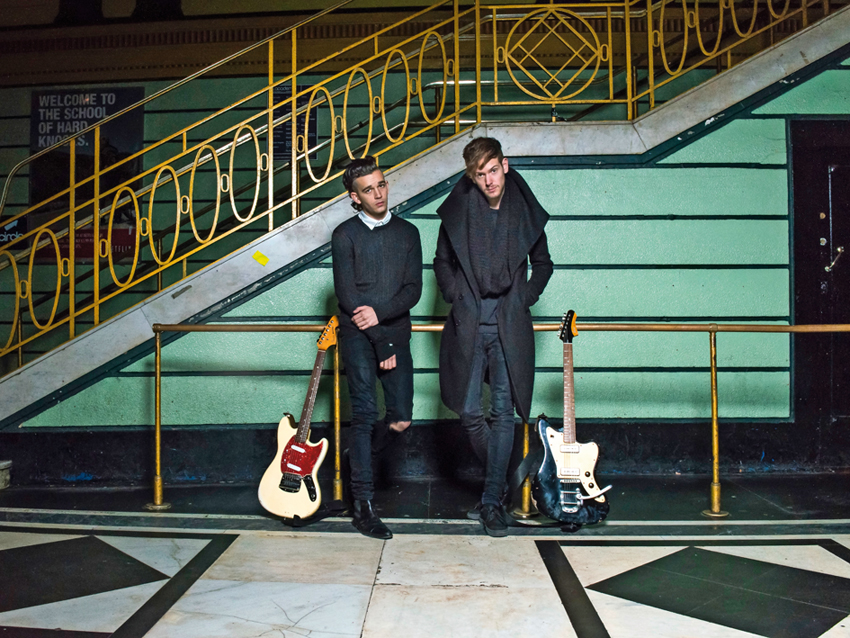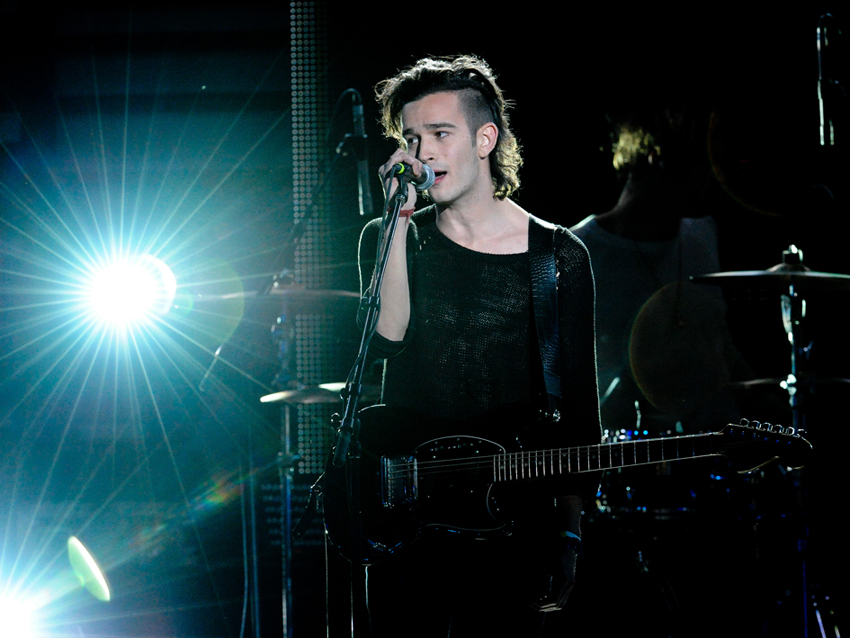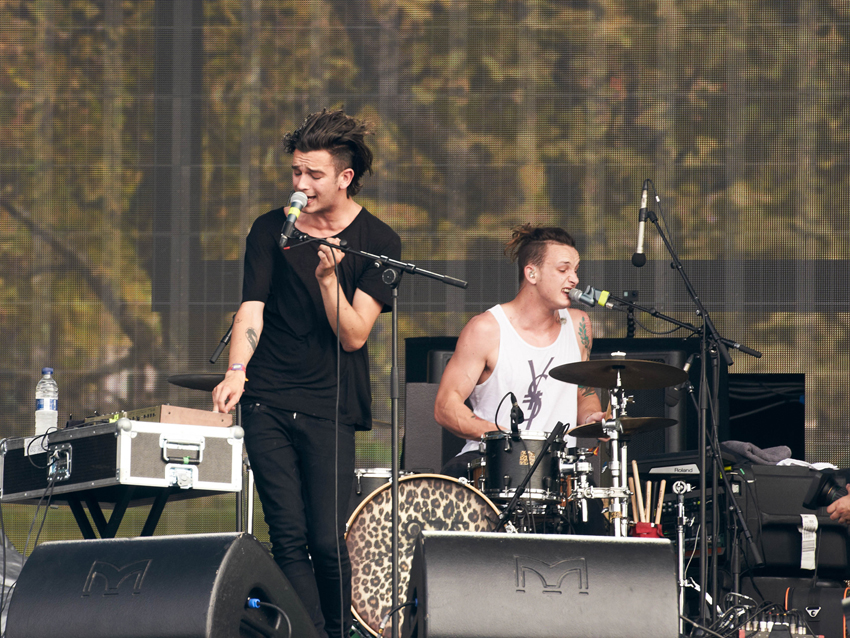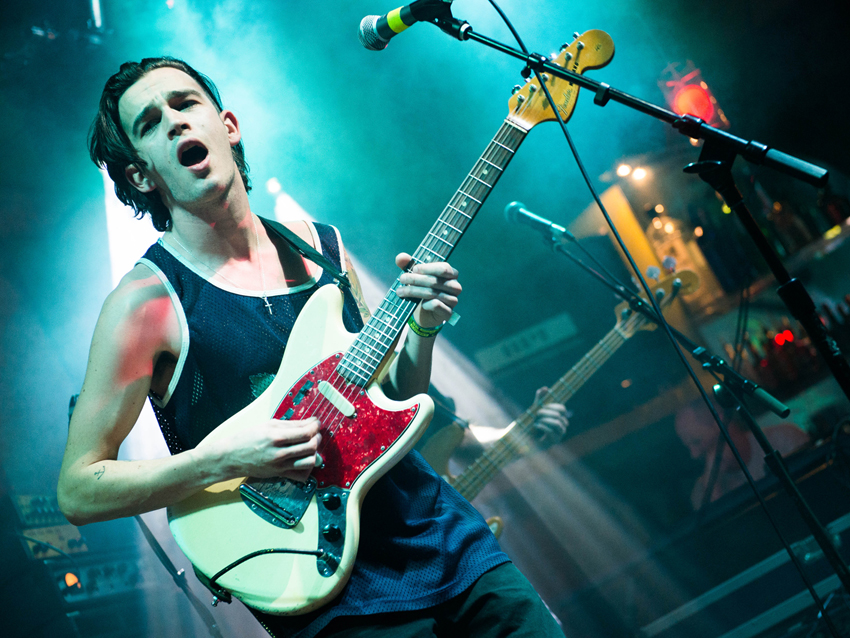The 1975 talk Mustangs and massive songs
Guitar-wielding boys-least-likely-to on chart success

The 1975 talk Mustangs and massive songs
Back in 2013, if you’d asked the music press which guitar band would have a chart- topping debut and play three nights at Brixton Academy within a year, few would have cited The 1975.
12 months on, MusicRadar is sat opposite guitarists Matt Healy and Adam Hann in that prestigious venue, midway through a UK tour that has seen them sell 15,000 tickets for their London shows alone.
Having formed at 14 and endured 10 years of obscurity, the Cheshire-via-Manchester four-piece have proved the industry obsession with hype and fashionable influences accounts for approximately nothing in the eyes and ears of the record-buying public. Alongside the likes of Haim and London Grammar, The 1975 have stormed the charts and made us question what constitutes a guitar band in the 21st century.
MusicRadar found out how they build their seamless synth/guitar sounds, why the chorus will always be king, and how a battered Fender Mustang changed everything...

Hype and eclecticism
You seemed to come from nowhere in last year. Why do you think you had such a successful breakthrough?
Matt: “I think it’s because we just released a wealth of material that people could make their own mind up about and find themselves in, as opposed to being told by the f**king NME that we’re the next biggest band in the world... We didn’t get any lists [at the start of 2013], everything’s been publicly driven.”
Adam: “[Interjecting] I should say that we wouldn’t have expected to be in this position, either...”
Do you think there’s a greater appetite for guitar music in the charts now?
Matt: “I’ve always said it, but the reason people like our band is that we create music in the way that we consume it. It’s a generational thing. Nowadays, it’s fine to listen to Fleetwood Mac and A$AP Rocky. You can be a 17 year old and it’s cool to like Backstreet Boys! Everything’s really weird because of the internet, and I think that we’re a band that represents that idea and people can relate to that...
"We’re proud to be talking to Total Guitar because guitar is the detail to our band. We use guitars because they’re part of the musical vocabulary we grew up with, but we’re not defined by them.”

Massive songs, Motown and... Phil Collins
Your main influences centre around 80s pop and 90s R ’n’ B artists. What was it about those styles that made you gravitate towards them?
Matt: “That music was informed by earlier black music, like soul and Motown, and it was all very syncopated. Peter Gabriel, Michael Jackson, Phil Collins – it was all about the relationship and the space between the drums and the bass, and I think that tapped into me when I was a kid.”
Adam: “They have those massive pop tunes, but they also have that extensive back catalogue of diverse sounds.”
Matt: “But then there’s as much Talking Heads and My Bloody Valentine in our records as there is Boys II Men and Toni Braxton. We’re not a pastiche, though. So many bands will ‘do’ Cocteau Twins or ‘do’ My Bloody Valentine: all very cool, but if you don’t have massive songs, you’re not going to be a massive band.”

Guitar heroes and playing it live
Your musical heroes are primarily associated with synths, but you play guitar. Why?
Matt: “There is such a wishy-washy idea of what a band is now and I think people do relate to a classic formula, albeit with a more forward-thinking sound. And the guitars in our music need to be emphasised. You can have certain things on computers or samplers, but you can’t have a guitar that’s not live. It makes it a band.”
Did you have any guitar heroes that influenced your approach?
Matt: “We have a very minimalist approach, but there are guitar heroes for us – people like Tom Morello.”
Adam: “Yeah, he was just a bit different. He didn’t play it in the traditional way, he did it using his effects... You’re in danger of making it quite cheesy when you do that kind of thing, but he didn’t. That’s what made it so special.”
Matt: “You love an occasional dive-bomb, don’t you?”
Adam: “[Guiltily] Yeah...”
Who else do we hear in your playing? Where did the funk style of Girls come from, for example?
Adam: “That’s got a sort of INXS vibe.”
Matt: “Yeah – the idea of the duelling left and right [guitar] sounds. I love the way the guitars work in that song and I love single- note, syncopated lines.
"It’s kind of our own style, but it’s so informed by so many classics. That song is kind of our version of I Want You Back, too – it’s the same chords.”

Mustang mania and effects
You do a lot of writing and recording direct to laptops. How do you incorporate that onstage?
Matt: “Hann is very good at replicating the [studio] sounds using different things.”
Adam: “It’s very, very hard to get the exact sounds, but you can come quite close just by carefully picking out effects. I’ve found some great reverb pedals that are almost studio quality themselves – mainly the Eventide Space, which was used on the record, and the Strymon Timeline, a really amazing delay.”
What other guitar gear do you use live?
Adam:“I use a twin Hiwatt combo. It’s a very flexible, transparent amp. Then my main guitar is a Fano JM6. They’re handmade wound [Fralin] P-90s and a Bigsby in it, but I’ve got three of them now. Two JM6s and a GF6, which looks like a Fender Starcaster. I’ve also got an [Analogman] King Of Tone overdrive, a Boss compressor and a Z.Vex Fuzz Factory, which I use to nail some of the fuzzy synth sounds from the album. Then there’s a Pro Co RAT and an Electro-Harmonix HOG, through a TheGigRig [switching system].”
Matt: “I’m not as technical. I’ve got an Electro-Harmonix Clone Theory chorus, the Boss compressor, an Analogman Sun Face fuzz pedal, two small EHX Holy Grails and a Boss DD-3 delay. At the moment, I’m playing a Blackstar combo, the Artisan 30. Again, it’s very transparent. Then I’ve got a ’65 Mustang, a ’67 Mustang, a ’68 Mustang, and a ’78 Mustang.”

Becoming a big band
What drew you to the Fender Mustang?
Matt: “That guitar changed my life! I don’t use the word too lightly, but I got very depressed and I was in a bad way, just after a time when the band very much didn’t get signed. Our manager was going to Los Angeles and just said, ‘Just come with me and get away from it.’ So I went and I met loads of people and I ended up going out and looking for a guitar. I bought my ’65 Mustang and, since then, everything just changed.”
Adam: “It’s a brilliant guitar. It’s had Mojo pickups put in it now. It was a great-sounding guitar before, too, but maybe not ideal for playing 300 shows a year.”
Matt: “I’m very small as well, so it’s a great shape on me. Plus, if we’re going to be a big band, I want to have a synonymous shape!”
After 10 years struggling, what does it feel like to become that ‘big’ band?
Adam: “My perception has changed from when I was younger – or even from a few years ago – of bands in our position. My perception was ‘they’re massive’, then to actually be in that position, it doesn’t feel like the same thing.”
Matt: “We don’t regard ourselves as a big band – we don’t let ourselves. But the thing I do like is that a band like us – an audacious, wear-your-heart-on-your-sleeve pop band – has become the band of the people. And all the bands that are supposed to be perceived as cooler are the ones that are actually more controlled by an industry – it’s kind of ironic, isn’t it?”

Synths and six strings
Just as technology has erased the lines between music fans, it’s also eroding those between musicians.
Most of The 1975’s songs are recorded direct to laptops, while the whole band also trigger electronic sounds in their live sets. Most importantly, hits such as The City and Chocolate showcase a masterful melding of guitar and synth sounds.
“Synths are the fundamental,” explains Matt of their writing process. “It starts with George [Daniel, drums] making a beat and a synth sound. We normally use pads – these rolling synthesisers – in the background, then a bass line will get added and the guitars are the last thing, which is why they’re so detailed.
"A track like The City, that was a real composite of electronic music and live music: writing the live music, taking a live drum beat and then looping it, taking a live guitar and looping it. It was the first time we started using laptops and embracing it as our sound.”
For more information visit the official The 1975 website or connect with the band on Facebook and Twitter.
Matt is a freelance journalist who has spent the last decade interviewing musicians for the likes of Total Guitar, Guitarist, Guitar World, MusicRadar, NME.com, DJ Mag and Electronic Sound. In 2020, he launched CreativeMoney.co.uk, which aims to share the ideas that make creative lifestyles more sustainable. He plays guitar, but should not be allowed near your delay pedals.


